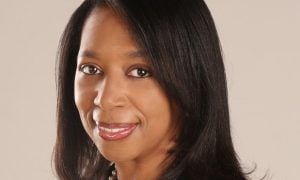'We shouldn't be frightened of targets and quotas' - black partners on the career barriers facing BAME lawyers
Black lawyers at firms including DLA, Linklaters and Ashurst on why ethnic minorities are so underrepresented at the top end of the UK legal profession
November 15, 2017 at 06:20 AM
6 minute read
Sandra Wallace never imagined she could make partner, let alone reach a leadership position at a top law firm.
"Being a lawyer and getting onto the executive board of a global law firm seemed inconceivable for a person from my background. My father was a painter and decorator and my mother was a housekeeper."
Wallace (pictured) is now DLA Piper's UK managing partner, a role she has held since 2015 after initially making partner in the firm's Birmingham employment practice in 1992.
Her success makes her one of only a tiny number of black, Asian and minority ethnic (BAME) partners currently working at the UK's leading law firms.
Figures provided to Legal Week by nine of the UK's 10 largest law firms show that only 7% of their UK partners are from minority ethnic backgrounds, a figure far below the 13% proportion of the UK population that identified as BAME at the time of the last census in 2011.
Given that this 13% figure rose to 40% in London and the majority of partners at major UK firms are based in London, the scale of the problem is obvious.
According to some of the BAME partners Legal Week spoke to, it is social class, rather than ethnicity, that is the biggest barrier to a profession that is notoriously white, male and middle-class. But with recent studies showing that BAME households are more likely to fall into lower income brackets, the result is the same, with this social divide resulting in a lack of BAME representation in law firms.
 Ashurst City private equity partner David Carter (pictured) says: "From my working-class background, there can be a fear that you are out of your depth – you've worked during the summers at university, never gone travelling on a gap year, and maybe you have nothing in common with the well-connected people involved in the international world of business. This stops people thinking that law is a job for them – wrongly. "
Ashurst City private equity partner David Carter (pictured) says: "From my working-class background, there can be a fear that you are out of your depth – you've worked during the summers at university, never gone travelling on a gap year, and maybe you have nothing in common with the well-connected people involved in the international world of business. This stops people thinking that law is a job for them – wrongly. "
Wallace adds: "I went to a polytechnic, Wolverhampton University, and everyone told me: 'you'll never get a job'. It's an environment that a lot of people still won't be used to. That's why having a mentor is so important."
The pernicious nature of racism is that you don't know if you've been held back from opportunities. How do I know what people have said in the corridors once I've walked past?
Law firms have started making inroads in their efforts to address this, but there is still a long way to go. At the most junior end, the PRIME work experience initiative is just one of a number of examples of initiatives aimed at UK state school pupils and candidates who are the first generation in their immediate family to attend university.
But while these efforts may be starting to pay off lower down the ranks, with the number of BAME junior lawyers working in the largest firms higher than for more senior lawyers, when it comes to career progression and making partner, the figures show there is much room for improvement.
This lack of representation is an issue for BAME lawyers, who say unconscious bias remains a problem. As Carter says: "The pernicious nature of racism is that you don't know if you've been held back from opportunities. How do I know what people have said in the corridors once I've walked past? I don't, but I would like to think that if they have a problem they would tell me."
 Linklaters' City capital markets counsel Paulette Mastin (pictured) comments: "It has not been a plain-sailing type of experience. The main barrier to progressing one's career as a woman of colour is bias. That is the single biggest challenge to BAME progression.
Linklaters' City capital markets counsel Paulette Mastin (pictured) comments: "It has not been a plain-sailing type of experience. The main barrier to progressing one's career as a woman of colour is bias. That is the single biggest challenge to BAME progression.
"It can affect things like work allocation, being considered for stretch assignments – these things can be difficult to put a finger on. Also, not being given those opportunities where you could raise your profile and get the best visibility."
Mastin is co-sponsor of Linklaters' BAME network and chair of the Black Solicitors Network (BSN). Since she founded BSN in 2008, its membership has swelled from about 30 BAME lawyers in the City to more than 400.
I think we are frightened of targets and quotas, and we shouldn't be
Many, including Mastin, believe targets could be the answer. While law firms have sought to address the lack of female partners with targets for some time, BAME targets have, to date, been far less prevalent.
Of the top 10 UK law firms, only Norton Rose Fulbright currently has an ethnicity target in place, and this is just for trainee level (the firm aims for a representation target of 25% and currently 27% of its trainees are BAME).
Mastin argues that all law firms should establish aspirational targets for recruitment, retention and promotion, and report against these annually. "As a measure, that is something in my view that should be considered. It goes hand in hand with targeted initiatives such as sponsorship, mentoring and leadership programmes."
It's an idea that is increasingly gaining traction. As Legal Week reported earlier this week, seven of the UK's 20 largest firms by revenue are actively considering ushering in targets: Eversheds Sutherland, Berwin Leighton Paisner, Ashurst, Gowling WLG, Pinsent Masons, CMS and Clyde & Co.
At DLA Piper, Wallace says that despite the absence of explicit targets, her firm expects suggestions for new hires and promotions to be diverse, both in terms of ethnicity and gender. "If you put up a list that looks all male and white, then that list will be challenged."
Longer term, she is also in favour of targets: "From a personal perspective, I think we are frightened of targets and quotas, and we shouldn't be. That should be the debate on the table."
For now though, the lack of ethnic diversity in law firm partnerships remains stark. Targets may well go some way towards alleviating the problem, but firms also need to recognise the extent to which unconscious bias could be a silent but significant factor limiting BAME lawyers' progression to partner.
Mastin concludes: "If you look at bias, at its core, it informs your actions and, left unchecked, can reinforce systems of marginalisation. Going forward, those who are in a position of power and decision making – my firm included – need to acknowledge the challenges of their BAME colleagues."
*Both Linklaters and Freshfields have yet to report 2017 figures, so the data for these firms is for 2016. Hogan Lovells was the only UK top 10 firm that declined to provide ethnicity data.
This content has been archived. It is available through our partners, LexisNexis® and Bloomberg Law.
To view this content, please continue to their sites.
Not a Lexis Subscriber?
Subscribe Now
Not a Bloomberg Law Subscriber?
Subscribe Now
NOT FOR REPRINT
© 2025 ALM Global, LLC, All Rights Reserved. Request academic re-use from www.copyright.com. All other uses, submit a request to [email protected]. For more information visit Asset & Logo Licensing.
You Might Like
View All
DeepSeek and the AI Revolution: Why One Legal Tech Expert Is Hitting Pause
4 minute read
What Happens When a Lateral Partner's Guaranteed Compensation Ends?

Lawyers React To India’s 2025 Budget, Welcome Investment And Tax Reform

Russia’s Legal Sector Is Changing as Western Sanctions Take Their Toll
5 minute readTrending Stories
- 1States Accuse Trump of Thwarting Court's Funding Restoration Order
- 2Microsoft Becomes Latest Tech Company to Face Claims of Stealing Marketing Commissions From Influencers
- 3Coral Gables Attorney Busted for Stalking Lawyer
- 4Trump's DOJ Delays Releasing Jan. 6 FBI Agents List Under Consent Order
- 5Securities Report Says That 2024 Settlements Passed a Total of $5.2B
Who Got The Work
J. Brugh Lower of Gibbons has entered an appearance for industrial equipment supplier Devco Corporation in a pending trademark infringement lawsuit. The suit, accusing the defendant of selling knock-off Graco products, was filed Dec. 18 in New Jersey District Court by Rivkin Radler on behalf of Graco Inc. and Graco Minnesota. The case, assigned to U.S. District Judge Zahid N. Quraishi, is 3:24-cv-11294, Graco Inc. et al v. Devco Corporation.
Who Got The Work
Rebecca Maller-Stein and Kent A. Yalowitz of Arnold & Porter Kaye Scholer have entered their appearances for Hanaco Venture Capital and its executives, Lior Prosor and David Frankel, in a pending securities lawsuit. The action, filed on Dec. 24 in New York Southern District Court by Zell, Aron & Co. on behalf of Goldeneye Advisors, accuses the defendants of negligently and fraudulently managing the plaintiff's $1 million investment. The case, assigned to U.S. District Judge Vernon S. Broderick, is 1:24-cv-09918, Goldeneye Advisors, LLC v. Hanaco Venture Capital, Ltd. et al.
Who Got The Work
Attorneys from A&O Shearman has stepped in as defense counsel for Toronto-Dominion Bank and other defendants in a pending securities class action. The suit, filed Dec. 11 in New York Southern District Court by Bleichmar Fonti & Auld, accuses the defendants of concealing the bank's 'pervasive' deficiencies in regards to its compliance with the Bank Secrecy Act and the quality of its anti-money laundering controls. The case, assigned to U.S. District Judge Arun Subramanian, is 1:24-cv-09445, Gonzalez v. The Toronto-Dominion Bank et al.
Who Got The Work
Crown Castle International, a Pennsylvania company providing shared communications infrastructure, has turned to Luke D. Wolf of Gordon Rees Scully Mansukhani to fend off a pending breach-of-contract lawsuit. The court action, filed Nov. 25 in Michigan Eastern District Court by Hooper Hathaway PC on behalf of The Town Residences LLC, accuses Crown Castle of failing to transfer approximately $30,000 in utility payments from T-Mobile in breach of a roof-top lease and assignment agreement. The case, assigned to U.S. District Judge Susan K. Declercq, is 2:24-cv-13131, The Town Residences LLC v. T-Mobile US, Inc. et al.
Who Got The Work
Wilfred P. Coronato and Daniel M. Schwartz of McCarter & English have stepped in as defense counsel to Electrolux Home Products Inc. in a pending product liability lawsuit. The court action, filed Nov. 26 in New York Eastern District Court by Poulos Lopiccolo PC and Nagel Rice LLP on behalf of David Stern, alleges that the defendant's refrigerators’ drawers and shelving repeatedly break and fall apart within months after purchase. The case, assigned to U.S. District Judge Joan M. Azrack, is 2:24-cv-08204, Stern v. Electrolux Home Products, Inc.
Featured Firms
Law Offices of Gary Martin Hays & Associates, P.C.
(470) 294-1674
Law Offices of Mark E. Salomone
(857) 444-6468
Smith & Hassler
(713) 739-1250









